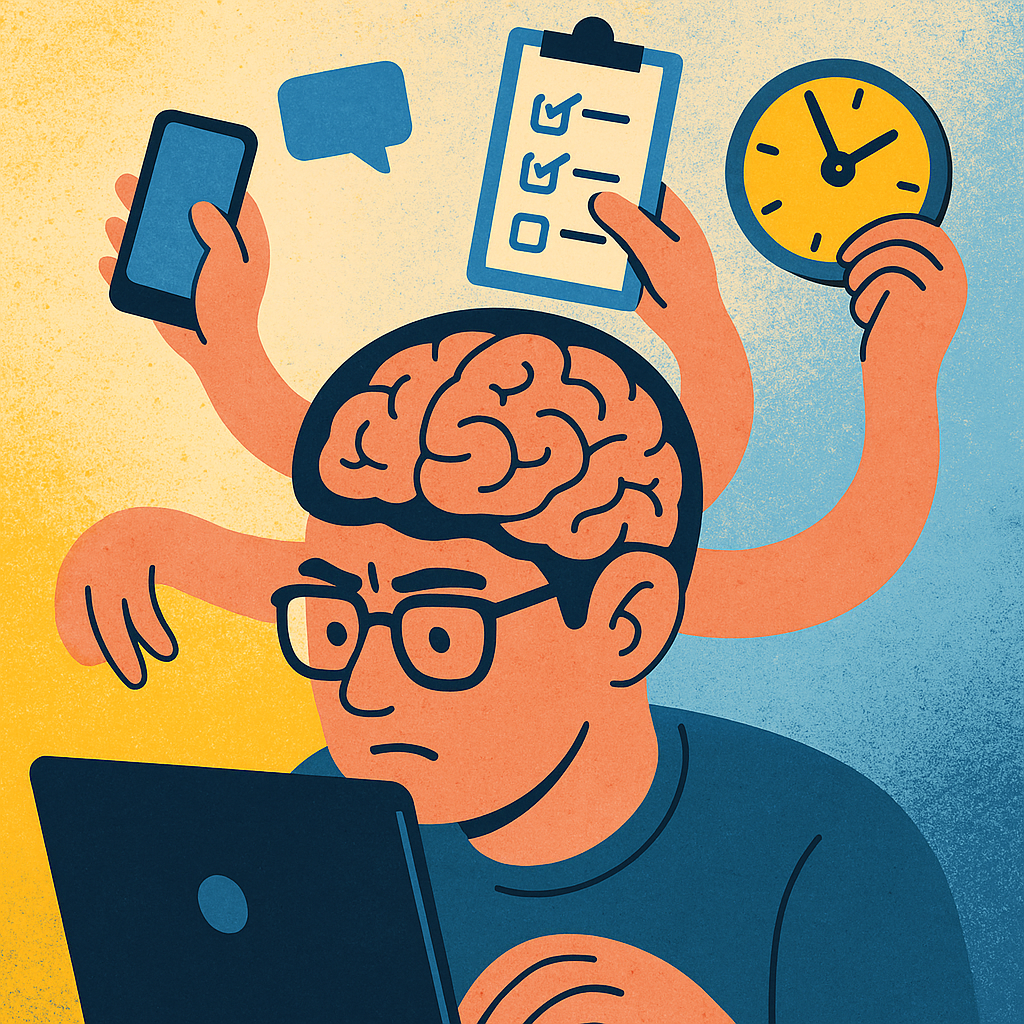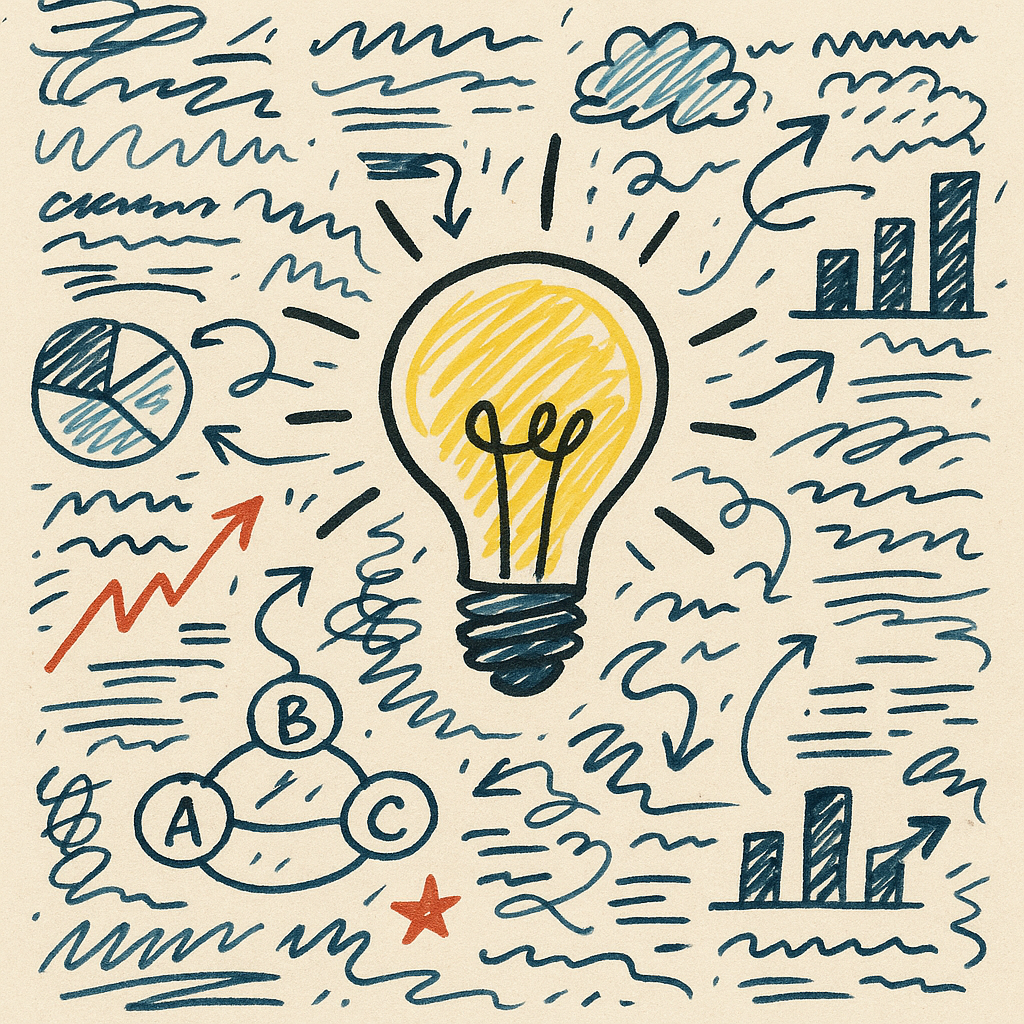Ever feel like juggling tasks makes you more productive? Think again. What Your Brain Really Thinks About Multitasking reveals how switching tasks actually impairs your focus, memory, and even IQ—yet it’s still a habit hard to break.

1. What Is Multitasking—and Why It Feels Efficient
We’ve all done it—answered emails while on Zoom, texted during meetings, toggled between tabs. The illusion of multitasking feels productive because it gives us the sense of doing more in less time. But the truth? Our brains aren’t wired for true multitasking.
According to cognitive psychologists, what we often call multitasking is actually “task-switching”—the brain rapidly shifting focus from one thing to another. This process isn’t seamless and comes with a significant cost: mental fatigue and lost time (Rubinstein, Meyer & Evans 2001).
2. The Hidden Cognitive Costs
Multitasking imposes several “switching costs,” including:
- Reduced efficiency: The American Psychological Association reports that shifting between tasks can reduce productivity by up to 40% (APA, n.d.).
- Weakened memory: Our working memory struggles when frequently interrupted, making it harder to store or retrieve information accurately.
- Increased error rate: Mistakes become more likely, particularly with tasks requiring critical thinking or complex problem-solving.
Researchers at Stanford University found that heavy multitaskers performed worse on memory tasks and had difficulty filtering irrelevant information (Ophir, Nass & Wagner 2009).
3. Brain Science: What Neuroscience Shows
Neuroimaging confirms what psychologists have long suspected: multitasking is inefficient at a biological level.
Functional MRI scans reveal that the prefrontal cortex—the brain’s control center—struggles to manage multiple tasks at once. Instead of parallel processing, the brain activates a “stop/start” mechanism each time we shift focus. This activation increases mental fatigue and slows down overall performance (Just et al. 2001).
Moreover, a 2023 study published in Nature Neuroscience found that chronic multitasking can reduce gray matter density in the anterior cingulate cortex, a region linked to emotional regulation and decision-making.
4. Digital Age Surge: Why It’s Worse Than Ever
The rise of smartphones, push notifications, and remote work environments has drastically increased multitasking tendencies:
- Media multitasking: Over 60% of adults now report using multiple screens simultaneously, like texting while watching Netflix (Pew Research, 2023).
- Digital amnesia: Relying on search engines and devices to recall information has been shown to weaken long-term memory retention—a phenomenon dubbed the “Google effect” (Sparrow et al., 2011).
- Cognitive offloading: Frequent tech use encourages our brains to outsource problem-solving, which dulls critical thinking over time.
In an age of constant digital stimulation, our ability to concentrate is under constant attack.
5. Multitasking vs. Monotasking: The Better Alternative
Switching isn’t superhuman—it’s productivity poison. Here’s how monotasking (focusing on one task at a time) outperforms multitasking:
- Deeper engagement: Tasks are completed faster and with greater quality.
- Better retention: Learning is more effective when attention isn’t divided.
- Reduced stress: There’s less mental strain and decision fatigue.
In fact, time-blocking—dedicating blocks of time to a single task—has been adopted by top productivity experts and is shown to improve output by as much as 50% (Bailey, 2021).
6. How Multitasking Impacts Workplace Productivity
Modern work culture often glorifies multitasking, but the costs to businesses are steep:
- Lost hours: A study by McKinsey found that employees lose 28% of their time each week due to interruptions and multitasking.
- Poor communication: Multitasking during meetings or emails results in overlooked details and miscommunication.
- Employee burnout: Continuous task-switching increases cortisol levels, contributing to chronic stress and burnout.
Companies like Google and Microsoft have begun training staff in focus-based work strategies, emphasizing uninterrupted “deep work” over constant availability.
7. Multitasking in Education: A Growing Problem
The habit of multitasking starts early. Students now frequently divide attention between lectures and smartphones or social media. Research from the University of Michigan found that students who multitask during study sessions perform significantly worse on exams (Junco, 2012).
Even background music, thought to aid concentration, has been shown to impair performance in tasks requiring complex reasoning. For effective learning, distraction-free environments matter more than ever.
8. Practical Tips to Fix the Habit
Here are strategies to break the multitasking cycle and regain focus:
- Prioritize tasks daily: Use a short to-do list with only 3–5 items.
- Time-block work periods: Allocate 30–90 minute intervals for single tasks.
- Silence notifications: Turn off alerts during focused work sessions.
- Use the Pomodoro Technique: 25 minutes focused work, 5-minute breaks.
- Mindful transitions: Pause between tasks to mentally reset.
Additionally, regular mindfulness practice—even just 10 minutes per day—has been shown to improve attention span and reduce susceptibility to distractions (Tang et al., 2007).
9. Conclusion
Multitasking may seem efficient, but the data is clear: it taxes the brain, hampers productivity, and damages memory. Our brains crave focus, not fragmentation. The next time you feel compelled to juggle tabs, emails, and calls—stop. Choose focus instead. Practice monotasking and give your brain the clarity it was built for.
What Your Brain Really Thinks About Multitasking is not just science—it’s a wake-up call. By replacing shallow task-switching with deliberate, focused attention, you not only boost performance—you regain control over your time and mental energy.
References
Rubinstein, Meyer & Evans (2001) – Task-switching costs NCBI PMC Article
APA – “Multitasking: Switching costs” APA Topic on Multitasking
Zhang et al. (2025) – Media multitasking & anticipatory brain function PubMed Abstract (2025)






